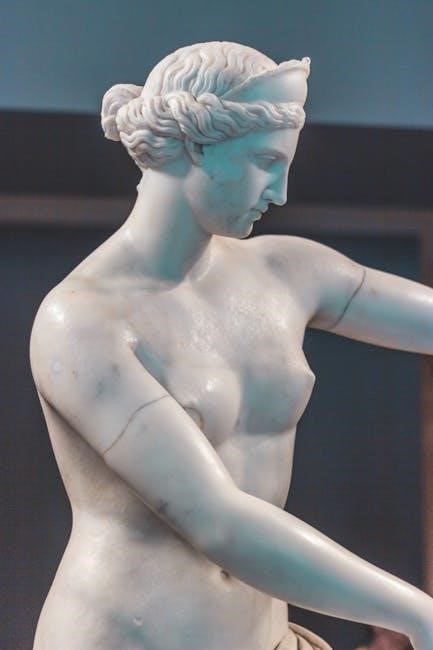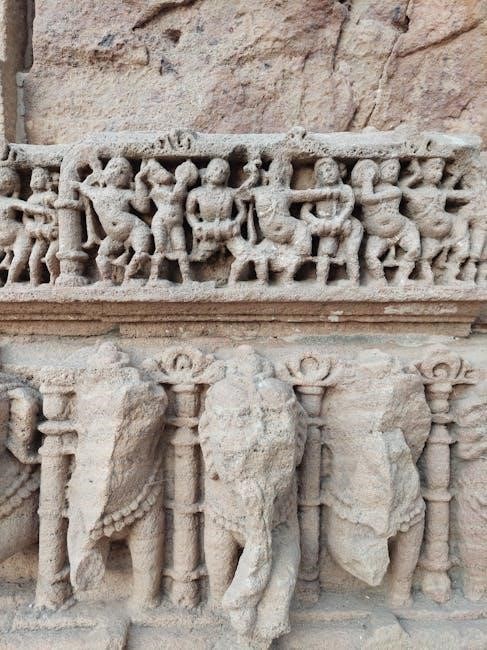Edith Hamilton’s Mythology is a timeless exploration of Greek and Roman myths, offering insights into heroism, fate, and human nature. This PDF version remains a vital resource for understanding classical narratives, making ancient stories accessible to modern readers.
Overview of the Book
Edith Hamilton’s Mythology is a comprehensive guide to Greek and Roman myths, exploring timeless tales of gods, heroes, and legendary creatures. The book captures the essence of classical mythology, tracing its evolution from ancient oral traditions to written records. Hamilton’s engaging narrative style makes complex myths accessible, offering readers a profound understanding of the cultural and historical significance of these stories. The PDF version ensures easy access to this invaluable resource.
Significance in Classical Literature
Edith Hamilton’s Mythology is a cornerstone of classical literature, preserving the timeless tales of Greek and Roman myths. These stories have shaped Western culture, influencing art, literature, and philosophy. Hamilton’s work bridges ancient traditions with modern understanding, making it an essential text for exploring the origins and enduring relevance of classical mythology in education and cultural studies.

Edith Hamilton: The Author
Edith Hamilton, a renowned scholar, brought ancient myths to life in her iconic book, making classical literature accessible and captivating for generations of readers worldwide.
Biographical Background
Edith Hamilton was a passionate advocate for classical education, dedicating her life to sharing the richness of Greek and Roman mythology. Her extensive research and deep understanding of ancient cultures are evident in her work, making her one of the most respected voices in the field of classical literature and mythology.
Motivations for Writing “Mythology”
Edith Hamilton was driven by a deep passion for classical education and a desire to make Greek and Roman myths accessible to a broader audience. She sought to preserve the timeless themes of heroism, fate, and human nature, believing these stories held universal relevance. Her work was inspired by a commitment to enlightening future generations about the cultural and moral insights embedded in ancient mythology.
Structure of the Book
Edith Hamilton’s Mythology is structured to explore Greek and Roman myths with clarity, drawing from poets like Homer and balancing both cultures’ legends for a comprehensive understanding.
Organization of Myths
Edith Hamilton’s Mythology is meticulously organized, blending Greek and Roman myths chronologically and thematically. Major gods, heroes, and legendary tales are presented with clarity, ensuring a logical flow. The book separates Greek and Roman myths while highlighting their cultural connections, offering readers a structured journey through ancient narratives and their enduring significance.
Logical Arrangement and Flow
Edith Hamilton’s Mythology is renowned for its clear and logical structure, guiding readers seamlessly through Greek and Roman myths. The PDF version maintains this flow, presenting tales chronologically and thematically. Hamilton’s narrative bridges cultural contexts, ensuring accessibility and coherence. This arrangement enhances understanding, making ancient myths resonate with modern readers while preserving their historical and cultural depth.
Key Themes in “Mythology”
Mythology explores heroism, fate, and human nature, revealing timeless truths about existence. Hamilton’s work highlights the universal relevance of myths, bridging ancient and modern understanding.
Heroism and Human Nature
Hamilton’s Mythology delves into the essence of heroism and human nature, portraying heroes as flawed yet noble figures. Their struggles and triumphs reflect universal truths about courage, ambition, and the human condition. The myths highlight the duality of human existence, balancing strength with vulnerability, and reveal how ancient stories continue to resonate with modern audiences, offering timeless lessons on morality and self-discovery.
Fate and the Gods
In Mythology, Hamilton explores the interplay between fate and divine influence, portraying gods as powerful yet fallible beings. The myths illustrate the inevitability of fate while highlighting human resilience. Gods often intervene in mortal affairs, but their actions are not always omnipotent, revealing a complex dynamic between destiny and free will. This duality underscores the enduring struggle between human ambition and the uncontrollable forces of fate.

The Impact of “Mythology”
Edith Hamilton’s Mythology has become a bestseller, profoundly influencing education and popular culture. Its accessible style has made classical myths a staple in curricula worldwide, shaping understanding of ancient narratives.
Popularity and Recognition
Edith Hamilton’s Mythology is a bestseller, widely recognized for its engaging storytelling. Its clear and vivid narratives have captivated readers, making it a cornerstone in classical literature. The book’s popularity endures, praised by scholars and general readers alike for its ability to bring ancient myths to life with timeless appeal and accessibility.
Influence on Educational Curricula
Edith Hamilton’s Mythology has profoundly shaped educational curricula, becoming a staple in classrooms worldwide. Its structured approach and clear narratives make it an ideal textbook for introducing students to classical myths. The book has influenced how mythology is taught, emphasizing critical thinking and cultural context, thus enriching academic programs focused on literature, history, and the humanities.

Relevance in Modern Times
Edith Hamilton’s Mythology remains relevant today, offering insights into universal themes like heroism and morality. Its exploration of human nature and cultural heritage continues to inspire modern thought and art, providing a timeless bridge between ancient and contemporary worlds.
Application of Myths Today
Myths from Edith Hamilton’s Mythology remain relevant, offering insights into human psychology, morality, and cultural identity. They inspire modern literature, art, and media, while their universal themes, such as heroism and struggle, continue to resonate in contemporary storytelling, education, and personal reflection, bridging ancient wisdom with today’s world.
Cultural and Psychological Insights
Edith Hamilton’s Mythology provides profound cultural and psychological insights, revealing the complexities of human nature through ancient tales. Myths explore emotions, desires, and moral dilemmas, offering timeless lessons. They reflect societal structures and values, while also highlighting the universal struggle between human frailty and divine aspirations, making them a rich source for understanding both individual and collective behavior across cultures and eras.

Educational Use of the Book
Edith Hamilton’s Mythology is widely used in classrooms, serving as a foundational text for teaching classical literature. Its clarity and engaging storytelling help students connect with ancient myths, fostering critical thinking and cultural understanding.
Role in Classroom Settings
Edith Hamilton’s Mythology serves as a vital educational resource, fostering critical thinking and cultural understanding. Its clear prose and engaging storytelling make it ideal for classroom use, helping students explore ancient myths and their relevance to human experiences. Teachers often integrate the book into curricula to teach literary analysis, historical context, and thematic connections, making it a cornerstone of classical education.
Teaching Strategies and Resources
Teachers often pair the PDF version of Mythology with digital tools, enabling interactive learning. Strategies include guided readings, digital annotations, and multimedia integration. Resources like study guides and online activities enhance comprehension. The book’s clear structure and accessible language make it ideal for classroom discussion, encouraging deeper analysis of myths and their cultural significance. Educators also use supplementary materials to connect myths to modern contexts, enriching student engagement.

Comparative Analysis
Hamilton’s Mythology stands out for its engaging storytelling, balancing drama and moral insight. It differs from academic sources by prioritizing narrative flow over scholarly detail, making myths relatable and timeless.

Hamilton’s Work vs. Other Sources
Edith Hamilton’s Mythology is celebrated for its engaging narrative style, making myths accessible to a broad audience. Unlike scholarly texts, it prioritizes storytelling over academic analysis, offering vivid retellings of Greek and Roman myths. While other sources may delve into historical context or linguistic details, Hamilton’s work excels in capturing the emotional and moral essence of the stories, rendering them timeless and relatable for modern readers.
Unique Perspectives and Contributions
Edith Hamilton’s Mythology stands out for its ability to bridge ancient and modern worlds, offering a fresh perspective on timeless tales. By emphasizing universal themes like human nature and morality, Hamilton made mythology accessible beyond academia. Her work uniquely balances depth with readability, inspiring educators and captivating readers for generations, ensuring its enduring relevance in both literary and educational contexts.
Study Guide for the PDF Version

Effective Reading Strategies
The PDF version of Mythology offers enhanced readability with digital tools. Use bookmarks, search functions, and note-taking features to engage deeply with the text and its themes.
Maximize your understanding of the PDF version by using digital tools like bookmarks and search functions to navigate easily. Highlight key passages and take notes digitally to engage deeply with the myths. Create a study schedule to pace your reading, ensuring consistent progress. Utilize the table of contents to jump between sections and review complex themes. Digital annotations allow for personalized insights, enhancing your comprehension of Hamilton’s work.
Utilizing Digital Features
The PDF version of Mythology offers digital tools that enhance study. Use bookmarks and hyperlinks for easy navigation, and employ the search function to locate specific myths quickly. Digital annotations allow for personalized notes, while the table of contents provides swift access to sections. These features facilitate a deeper engagement with Hamilton’s work, making the reading experience more efficient and enriched.
Edith Hamilton’s Mythology is a timeless exploration of Greek and Roman myths, offering insights into heroism, fate, and human nature. A vital resource for classical literature enthusiasts, ensuring its relevance for future generations.
Final Thoughts on the Book’s Value
Edith Hamilton’s Mythology remains a cornerstone of classical literature, offering profound insights into human nature, heroism, and fate. Its timeless narratives continue to captivate readers, making it an indispensable resource for both scholars and enthusiasts. The book’s accessibility and depth ensure its enduring relevance, solidifying its legacy as a vital exploration of ancient myths and their universal appeal.
Encouragement for Further Exploration
Edith Hamilton’s Mythology is a gateway to the timeless wisdom of ancient cultures. Readers are encouraged to delve deeper into its themes and explore how myths shape modern understanding. The PDF version offers convenient access, enabling immersive study. Embrace this journey into classical literature and uncover the enduring relevance of these captivating tales in today’s world.



